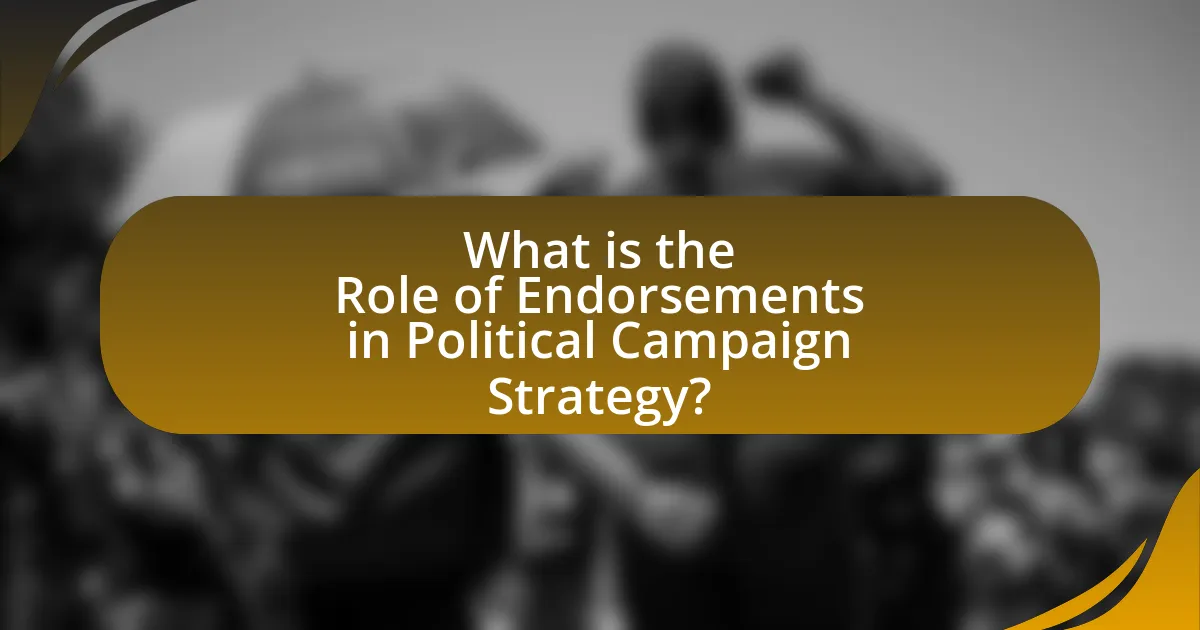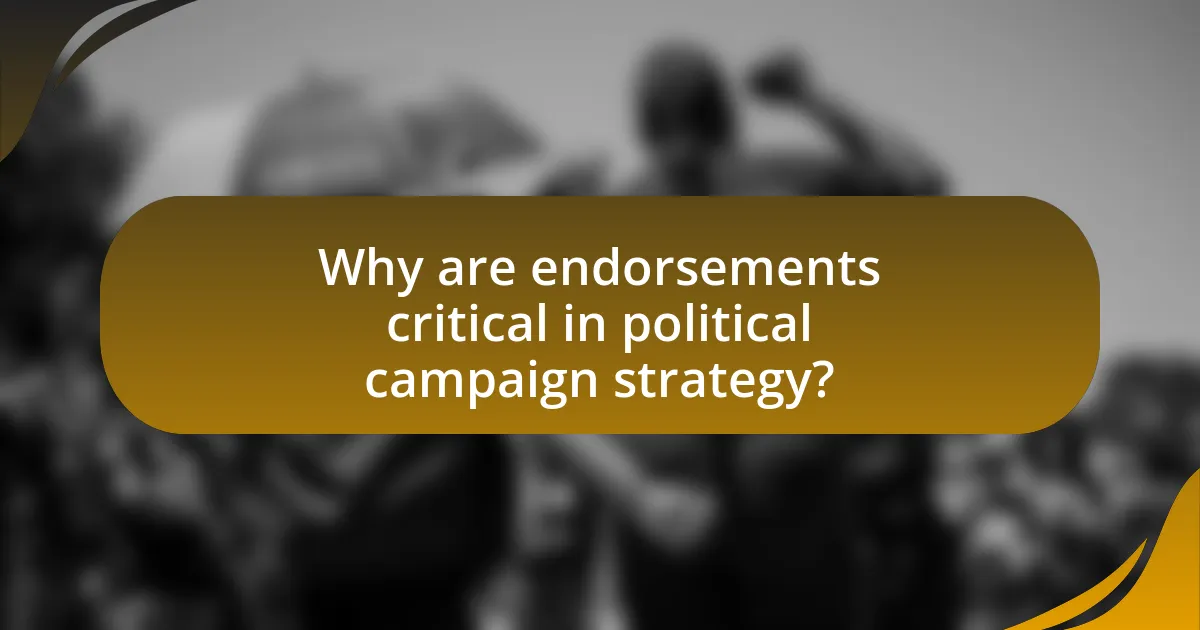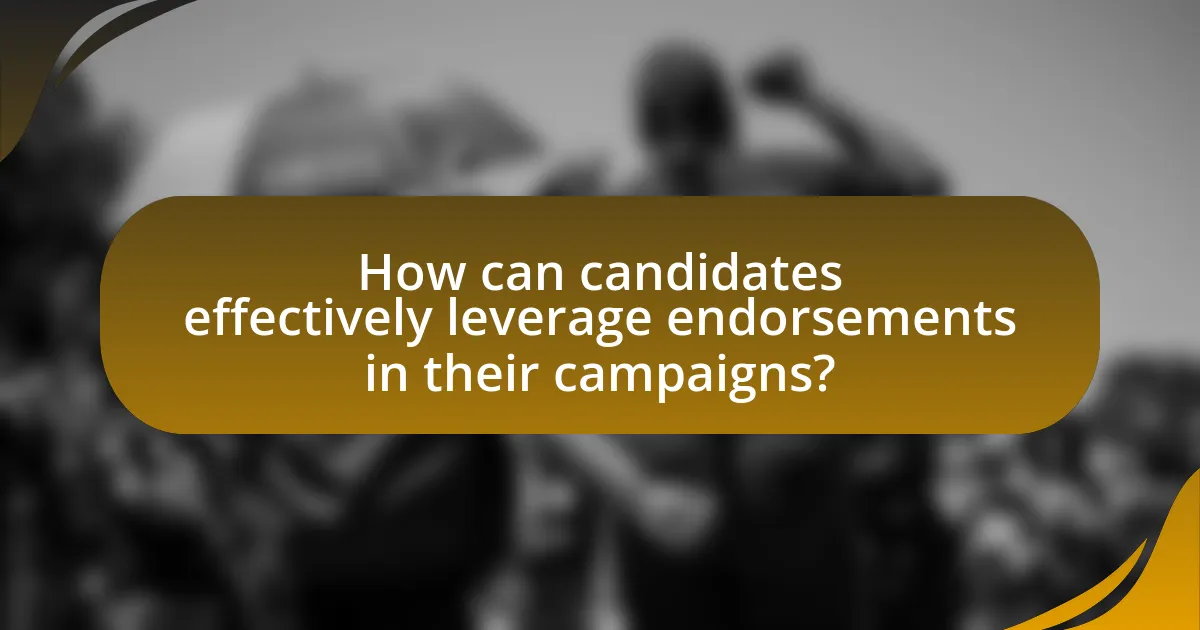The article examines the critical role of endorsements in political campaign strategy, highlighting how they enhance a candidate’s credibility and expand their reach to voters. It discusses the influence of endorsements on voter perception, the psychological factors that make them effective, and the various types of endorsements, including individual, organizational, and party endorsements. The article also addresses the impact of endorsements on fundraising efforts, campaign visibility, and the potential risks associated with controversial endorsements. Additionally, it outlines strategies for candidates to secure and leverage endorsements effectively while avoiding common pitfalls.

What is the Role of Endorsements in Political Campaign Strategy?
Endorsements play a crucial role in political campaign strategy by enhancing a candidate’s credibility and expanding their reach to potential voters. When influential figures or organizations publicly support a candidate, it signals to the electorate that the candidate is trustworthy and has the backing of respected entities. For instance, endorsements from prominent political figures can sway undecided voters and mobilize specific demographic groups, as seen in the 2008 presidential campaign when Barack Obama received endorsements from various high-profile individuals, which significantly boosted his visibility and appeal. Additionally, endorsements can provide access to resources, including funding and volunteer support, further strengthening a campaign’s overall effectiveness.
How do endorsements influence voter perception?
Endorsements significantly influence voter perception by enhancing the credibility and appeal of a candidate. When a respected figure or organization endorses a candidate, it can lead voters to view that candidate more favorably, often due to the perceived alignment of values or expertise. Research conducted by the Pew Research Center indicates that endorsements can sway undecided voters, as they often rely on trusted sources to make informed decisions. Furthermore, a study published in the Journal of Politics found that candidates who receive endorsements from influential political figures tend to experience an increase in poll numbers, demonstrating the tangible impact endorsements have on voter attitudes and choices.
What psychological factors make endorsements effective?
Endorsements are effective due to several psychological factors, including credibility, social proof, and emotional appeal. Credibility arises when a trusted figure endorses a candidate, enhancing the perceived reliability of the message. Social proof influences voters by demonstrating that others support the candidate, creating a bandwagon effect. Emotional appeal connects with voters on a personal level, fostering a sense of loyalty and alignment with the endorser’s values. Research indicates that endorsements can increase voter turnout by as much as 10%, highlighting their significant impact on electoral outcomes.
How do endorsements shape candidate credibility?
Endorsements significantly enhance candidate credibility by providing validation from trusted figures or organizations. When a well-respected individual or group endorses a candidate, it signals to voters that the candidate possesses qualities deemed worthy of support, such as competence and integrity. For instance, endorsements from influential political leaders or reputable organizations can lead to increased public trust, as seen in the 2008 U.S. presidential election when Barack Obama received endorsements from prominent figures like Ted Kennedy, which bolstered his image among voters. This phenomenon occurs because endorsements often serve as a heuristic, allowing voters to make quicker decisions based on perceived authority rather than exhaustive research on each candidate.
What types of endorsements exist in political campaigns?
In political campaigns, there are several types of endorsements, including individual endorsements, organizational endorsements, and party endorsements. Individual endorsements come from prominent figures, such as celebrities or respected community leaders, who lend their personal support to a candidate. Organizational endorsements are provided by groups, such as labor unions or advocacy organizations, which can mobilize their members to support a candidate. Party endorsements occur when a political party officially supports a candidate, often providing resources and a platform to amplify the candidate’s message. These endorsements can significantly influence voter perceptions and campaign dynamics, as they often carry weight in the eyes of the electorate.
What are the differences between individual and organizational endorsements?
Individual endorsements are personal recommendations made by a single person, while organizational endorsements are formal approvals given by groups or institutions. Individual endorsements often reflect personal beliefs and can resonate on a more emotional level with voters, as they are tied to personal experiences or relationships. In contrast, organizational endorsements typically carry more weight due to the collective authority and resources of the organization, often influencing a larger audience through established networks. For example, endorsements from political parties or influential advocacy groups can significantly impact voter perceptions and mobilization efforts, as these organizations often have established credibility and outreach capabilities.
How do celebrity endorsements impact political campaigns?
Celebrity endorsements significantly enhance political campaigns by increasing visibility and credibility among voters. Research indicates that endorsements from well-known figures can sway public opinion, particularly among younger demographics who may be more influenced by celebrities than traditional political figures. For instance, a study published in the Journal of Political Marketing found that candidates endorsed by celebrities experienced a 10% increase in voter turnout compared to those without such endorsements. This impact is attributed to the ability of celebrities to attract media attention and engage audiences on social media platforms, thereby amplifying the candidate’s message and reach.

Why are endorsements critical in political campaign strategy?
Endorsements are critical in political campaign strategy because they enhance a candidate’s credibility and visibility among voters. When influential figures or organizations publicly support a candidate, it signals to the electorate that the candidate is trustworthy and has the backing of respected entities. For instance, endorsements from prominent political figures can lead to increased media coverage and voter interest, as seen in the 2008 presidential campaign when Barack Obama received endorsements from key figures like Ted Kennedy, which significantly boosted his campaign’s momentum. Additionally, endorsements can mobilize specific voter demographics, as organizations often have established networks that can be leveraged to increase voter turnout.
How do endorsements affect fundraising efforts?
Endorsements significantly enhance fundraising efforts by increasing credibility and attracting donor interest. When a candidate receives an endorsement from a well-respected figure or organization, it signals to potential donors that the candidate is a viable choice, which can lead to increased contributions. For example, a study by the Pew Research Center found that candidates endorsed by prominent political figures raised, on average, 20% more in campaign contributions compared to those without endorsements. This correlation demonstrates that endorsements not only boost a candidate’s visibility but also create a sense of urgency and legitimacy that motivates donors to contribute financially.
What role do endorsements play in attracting donors?
Endorsements play a crucial role in attracting donors by enhancing a candidate’s credibility and appeal. When a respected figure or organization endorses a candidate, it signals to potential donors that the candidate is a viable choice, increasing their likelihood of contributing. Research indicates that candidates with endorsements from influential individuals or groups often see a significant boost in fundraising; for example, a study by the Center for Responsive Politics found that candidates endorsed by prominent political figures raised 30% more than those without such endorsements. This demonstrates that endorsements not only validate a candidate’s platform but also mobilize financial support from donors who align with the endorser’s values and influence.
How can endorsements enhance campaign visibility?
Endorsements enhance campaign visibility by leveraging the credibility and influence of the endorser to reach a broader audience. When a well-known figure, such as a celebrity or political leader, publicly supports a candidate, it can attract media attention and increase public interest, thereby amplifying the campaign’s message. For instance, a study by the Pew Research Center found that endorsements from trusted figures can significantly sway voter opinions and increase engagement, as they often serve as a signal of trustworthiness and alignment with the endorser’s values. This dynamic not only boosts visibility but also fosters a sense of legitimacy for the campaign.
What are the potential risks associated with endorsements?
The potential risks associated with endorsements include damage to credibility, alienation of voters, and potential backlash from controversies surrounding the endorser. When a candidate receives an endorsement, they may face scrutiny regarding the endorser’s past actions or statements, which can lead to a loss of trust among constituents. For instance, if an endorser is involved in a scandal, the candidate may be perceived as complicit or out of touch with voter values. Additionally, endorsements can polarize the electorate; supporters of the endorser may rally behind the candidate, while opponents may feel alienated, potentially reducing overall voter support. Historical examples, such as endorsements that backfire during elections, illustrate these risks, highlighting the importance of carefully considering the implications of endorsements in political campaign strategies.
How can a controversial endorsement backfire on a candidate?
A controversial endorsement can backfire on a candidate by alienating key voter demographics and damaging their public image. When a candidate receives support from a figure or organization with a polarizing reputation, it can lead to backlash from constituents who disagree with that endorsement. For instance, endorsements from individuals associated with extreme views can cause moderate voters to distance themselves from the candidate, resulting in decreased support. Historical examples include candidates who lost elections after being endorsed by controversial figures, illustrating that such endorsements can overshadow a candidate’s message and lead to a decline in overall voter trust and engagement.
What happens when endorsements are retracted?
When endorsements are retracted, the candidate loses the associated credibility and support that the endorsement provided. This loss can lead to a decline in public perception and voter confidence, as endorsements often signal approval from influential figures or organizations. For example, a study by the Pew Research Center found that endorsements can significantly sway voter opinions, indicating that their retraction can have a tangible negative impact on a candidate’s campaign momentum.

How can candidates effectively leverage endorsements in their campaigns?
Candidates can effectively leverage endorsements in their campaigns by strategically selecting influential figures whose support aligns with their values and target demographics. By showcasing endorsements from respected community leaders, organizations, or public figures, candidates can enhance their credibility and appeal to voters. For instance, a study by the Pew Research Center indicates that endorsements can significantly sway undecided voters, as they often rely on trusted figures to guide their choices. Additionally, candidates should actively promote these endorsements through various channels, such as social media, campaign events, and advertisements, to maximize visibility and impact.
What strategies can candidates use to secure endorsements?
Candidates can secure endorsements by building strong relationships with influential figures and organizations. Establishing connections through networking, attending events, and engaging in community activities allows candidates to demonstrate their commitment and values, which can resonate with potential endorsers. Additionally, candidates should clearly communicate their platform and how it aligns with the interests of the endorsers, making it easier for them to support the candidate publicly. Research indicates that candidates who actively seek out endorsements from respected leaders often see increased credibility and voter trust, as endorsements can significantly influence public perception and voter behavior.
How important is networking in obtaining endorsements?
Networking is crucial in obtaining endorsements, as it facilitates relationships that can lead to support from influential figures. Effective networking allows candidates to connect with key stakeholders, such as party leaders, community influencers, and potential endorsers, who can sway public opinion and lend credibility to a campaign. Research indicates that candidates with strong networks are more likely to receive endorsements, as these relationships often translate into trust and visibility. For instance, a study by the Pew Research Center found that personal connections significantly impact endorsement decisions, highlighting the importance of networking in political contexts.
What role does timing play in the endorsement process?
Timing is crucial in the endorsement process as it can significantly influence the effectiveness and impact of the endorsement on a political campaign. Endorsements that are strategically timed, such as those announced during key moments in the campaign, can amplify their visibility and relevance, thereby swaying voter opinions more effectively. For instance, endorsements released shortly before primary elections can provide candidates with a critical boost in momentum, as seen in the 2008 Democratic primary when endorsements from influential figures like Ted Kennedy helped Barack Obama gain traction against Hillary Clinton. This demonstrates that the timing of endorsements can align with voter sentiment and media cycles, enhancing their overall effectiveness in shaping electoral outcomes.
What best practices should candidates follow when utilizing endorsements?
Candidates should prioritize authenticity and relevance when utilizing endorsements. Authentic endorsements from respected figures can enhance credibility and resonate with voters, as evidenced by a study from the Pew Research Center, which found that 70% of voters trust endorsements from community leaders. Additionally, candidates should strategically select endorsers whose values align with their campaign message, ensuring that the endorsement feels genuine and not merely transactional. This alignment fosters a stronger connection with the target audience, increasing the likelihood of voter support.
How can candidates ensure endorsements align with their campaign message?
Candidates can ensure endorsements align with their campaign message by carefully selecting endorsers whose values and public personas resonate with their own platform. This alignment can be achieved through thorough research on potential endorsers, assessing their past statements, actions, and public perceptions to confirm compatibility with the campaign’s core messages. For instance, a candidate advocating for environmental policies should seek endorsements from well-known environmental activists or organizations, as this reinforces their commitment to the cause and enhances credibility. Historical examples, such as Barack Obama’s endorsements from prominent figures in the civil rights movement during his 2008 campaign, illustrate how strategic endorsements can amplify a candidate’s message and appeal to specific voter demographics.
What are the key considerations for managing multiple endorsements?
Key considerations for managing multiple endorsements include ensuring alignment with campaign values, maintaining clear communication with endorsers, and strategically leveraging endorsements to enhance credibility. Alignment with campaign values is crucial, as conflicting endorsements can confuse voters and dilute the campaign message. Clear communication with endorsers helps manage expectations and fosters strong relationships, which can be vital for mobilizing support. Additionally, strategically leveraging endorsements can amplify the campaign’s reach and influence, as endorsements from respected figures can enhance the candidate’s credibility and appeal to specific voter demographics.
What common mistakes should candidates avoid regarding endorsements?
Candidates should avoid the mistake of seeking endorsements from individuals or organizations that do not align with their values or target audience. Misalignment can lead to a loss of credibility and alienate potential supporters. Additionally, candidates often err by not adequately vetting the endorsers, which can result in negative publicity if the endorser becomes controversial. Another common mistake is failing to leverage endorsements effectively in campaign messaging, as endorsements can significantly enhance a candidate’s visibility and perceived legitimacy when communicated properly. Lastly, candidates should avoid over-relying on endorsements at the expense of building their own brand and connecting directly with voters, as personal engagement remains crucial in political campaigns.
